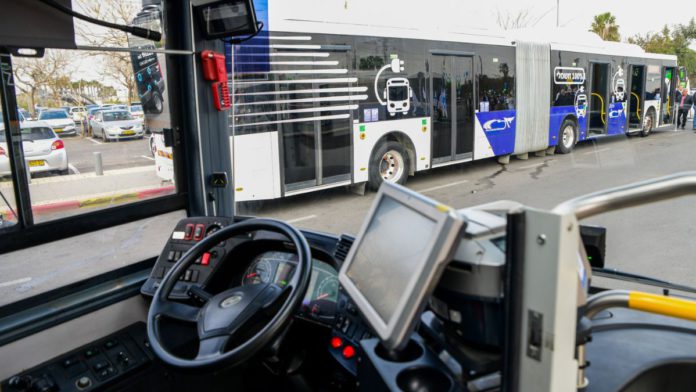In an effort to reduce the notorious traffic congestion in the nation and enhance services to promote public transportation, Israel is poised to trial self-driving public buses over the next two years.
The Israel Innovation Authority (IIA) announced on Sunday that four consortiums had been chosen to conduct the trial across the nation. The pilot trial will begin with the first phase of operating and testing in a secured and controlled environment to demonstrate technological, regulatory, safety, and business viability. Then the trial will move to the second phase, where they will run self-driving bus lines on public roads within a range that will grow over the course of the two-year trial project.
As part of the national plan for autonomous public transportation, which was first unveiled in April, the state is contributing half of an investment of NIS 61 million shekels (US$17 million) for the pilot with the aim of examining the viability of integrating autonomous vehicles into Israel’s public transportation system.
The IIA will provide the groups with half of the funding for their pilots, and they will work inside a unique, cutting-edge regulatory framework created by the National Public Transport Authority of the Transportation Ministry, which will also provide them with licenses and supervision.
Traffic congestion has been plaguing Israeli roads for a long time and optimizing public transportation would enhance service, the passenger experience, and safety standards. By switching to a fleet of driverless buses, it will also assist the state transport authorities in dealing with a shortage of bus drivers.
The four companies participating in the public transportation pilot trial include the two main bus companies in Israel, i.e., Egged (which has the largest intercity routes) and Dan (which exclusively operates in the Gush Dan region). The other two companies are Metropoline (which offers bus routes in southern Israel to and from Tel Aviv and Beersheba as well as within and between communities in the Sharon region) and Nateev Express, based in Nazareth, which runs routes across the Upper Galilee in the north.
Read More: Waymo’s Robotaxi Service to hit roads in Los Angeles
These four transportation companies will collaborate with their various groups of startups and organizations in Israel, France, Turkey, Norway, and the United States.
For instance, Egged is collaborating with an unnamed French auto manufacturer whose autonomous car is now being tested in 20 nations. The Dan company will team up with its longtime partner, mobility and ride-sharing company Via Transportation (with whom it operates the Bubble shuttle system in and around Tel Aviv), as well as EasyMile, the French developer of a battery-powered autonomous electric bus, and Israeli firms Enigmatos, an autonomous security startup, and Ottopia, which produces assistive technology for autonomous vehicles. EasyMile already has fleets of self-driving buses in France and Germany.
Metropoline will also work with Ottopia, Michigan-based autonomous driving software platform Adastec, Turkish bus manufacturer Karsan, and Norwegian fleet management company Applied Autonomy for its trial. Adastec and Applied Autonomy are also participating in other pilot initiatives for self-driving technology in Michigan and Norway, respectively. Nateev Express will collaborate with Israeli company Imagry, the creator of a camera-based, Level 4-5 self-driving platform, to run autonomous shuttles in and around the Chaim Sheba Medical Center, which is Israel’s largest hospital, situated in Ramat Gan.
According to the IIA, the initiative will allow policymakers to map the infrastructure needed to run an autonomous public transportation system and examine the commercial potential of such a venture. Groups who successfully implement and finish the two-year trial will be granted contracts to expand their services in Israel.


